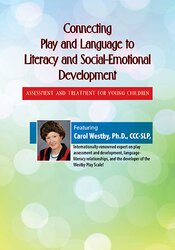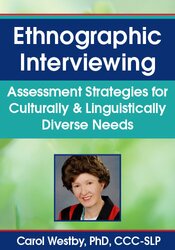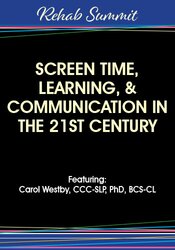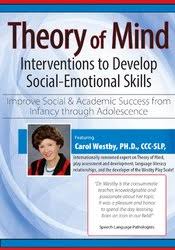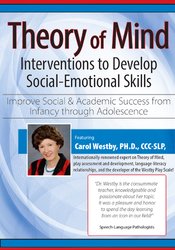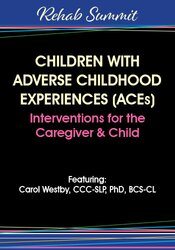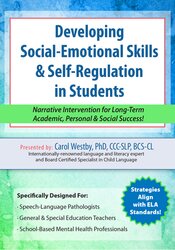What You’ll Discover in Carol Westby Play & Language The Roots of Literacy
- Faculty:
- Carol Westby
- Duration:
- 6 Hours 16 Minutes
- Format:
- Audio and video
- Copyright:
- Nov 08, 2019
Description
Dr. Westby Learn about the crucial relationship between the dimensions. of Socializing,-Language, literacy, and emotional functioning.
Learn firsthand how to effectively use the Westby Play Scale – a tool that offers a way to evaluate all young children’s (birth-5 years) Skills in symbolic play.
Forty years of support of Evidence-This tool is based on research and is organized by developmental level. It will break down the milestones that children should reach with their language and play.
Play strategies and play techniques to improve language, cognition and social communication will be taught.-Emotional skills are crucial for academic success and literacy development.
- Higher-Problem solving, level thinking-Problem solving and creativity
- Language skills and comprehension improvement
- Awareness of temporal, cause-Effect and social relationships
- Motivation and self-motivation-Regulation and empathy
- Interpreting and responding appropriately in accordance with the needs, wants, and roles of Others
These intervention activities are applicable to all young children. However, special attention will be paid to children with autism and language learning disabilities.-Economic/cultural variations and ESL
Observing children’s play provides information about their knowledge, view of The world is your oyster, and you have the ability to master it.
Handouts
| Manual Play & Language (5.29 MB) | 71 Pages | Available after Purchase | |
| Instructions for ASHA Credit-SELF STUDY ONLY – 11/08/19 (38.5KB) | Available after Purchase |
Outline
Foundations of Cognitive-Play-Literacy Relationship: Frameworks for Assessment/Intervention
- Dynamic systems theory – Integrating nurture and nature theories
- The World Health Organization’s International Classification of Functioning
- Framework for performance competence assessment and intervention
Social-Emotional/Cognitive Precursors PlayBirth-17 Months
- Atypical and neurotypical patterns of social emotional development
- Influences of the environment on play and social emotional development
- Temperamental differences in children
- Presymbolic Play
Development of Pretend Play Dimensions (17 months – 5 years): Relationship of Play Dimensions Language & Literacy
- Theory of Mind Dimension (understanding thoughts, feelings and understanding them) of (Self & Others)
- Decontextualization Dimension (reduced usage) of Props in play
- Thematic Dimension (from common to novel pretend themes).
- Organization Dimension (sequencing & planning of play)
Interventions to Encourage Playing to Learn
- For playful learning, set goals
- Promote literate-Style language through play
- Playful practices can help you develop phonological awareness skills
- Encourage thematic pretend play in order to build foundations for language learning and literacy
Faculty

Carol WestbyCCC-SLP, PhD, BCS-CL, ASDCS Similar seminars and products 8
Carol WestbyCCC-SLP, PhD, BCS-CL, ASDCS, She is an internationally recognized expert in play assessment and child development. She is the developer of The famous Westby Symbolic Play Scale, a research-based scale used to assess children’s social and play skills. Dr. Westby Project PLAY (Project Support for Personnel Preparation, Clinical Service, Research) was written and executed by her.Play And Language Attunement for Young Children) that trains caregivers to improve the development of young children of Theory of Mind, language.
Dr. Westby A fellow of The American-Speech-Language-Hearing Association (ASHA) is Board Certified in Child Language And Literacy Disorders and was awarded the Distinguished Alumnus Award by Geneva College and University of Iowa’s Department of The ASHA Award for Contributions in Multicultural Affairs, Speech Pathology and Audiology, and the Honors of ASHA, Kleffner Lifetime Career Award.
Dr. Westby Presented nationally and internationally on topics such as theory, autobiographical memories, and play. of Language is mind-literacy relationships, narrative/expository development and facilitation, adverse childhood experiences, screen time, trauma, metacognition/executive function, and assessment and intervention with culturally/linguistically diverse populations. She has also consulted with the New Mexico Preschool for the Deaf. They use a play approach to teaching.-based curriculum.
Dr. Westby She was a visiting professor at Flinders University, South Australia, where she worked on a literacy curriculum. At Brigham Young University, she consulted on SEEL (a systematic and engaging emergent literacy programme that uses playful practice). She is a consultant to Bilingual Multicultural Services, Albuquerque (NM), and has an affiliated appointment at Brigham Young University, Provo, UT, in Communication Disorders.
Speaker Disclosures
Financial: Carol Westby Consultant for Bilingual Multicultural Services. Dr. Westby She receives a speaking honourarium from PESI, Inc. of numerous chapters and articles, and is published by various publishers including Jones & Bartlett and Pearson.
Non-financial: Carol Westby Who is the developer? of The Westby Play Scale. Dr. Westby A fellow of The American-Speech-Language-Hearing Association.
Online viewing or digital download | Online Viewing or Digital Download | Carol Westby – Play & Language – The Roots of Literacy
IMPORTANT: This is the entire “Carol Westby – Play & Language – The Roots of Literacy” It is totally Downloadable And Available Check your account
(In case of We will soon renew your broken link if it is not fixed.
We appreciate your patience.

